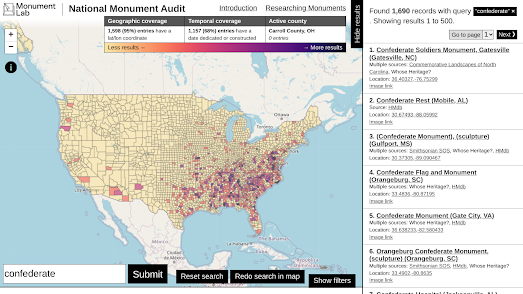Who Deserves a Monument Anyway?
Thanks to Geochicas and the Mapping Diversity project there has been quite a lot of data analysis undertaken over the last few years into the lack of diversity in the street names of cities around the world. According to Mapping Diversity in the 32 cities which they have analyzed "More than 90% of the streets named after individuals are dedicated to white men."
Of course naming streets after white men isn't the only way that we ignore the contributions to society by the majority of the population. We also like to raise monuments to white men. According to the National Monument Audit in the United States public monuments are predominantly representations of wealthy white males. In the top 50 represented individuals in US monuments only three women (Joan of Arc, Harriet Tubman, and Sacagawea) feature and only five black or indigenous individuals are recognized (Martin Luther King Jr., Harriet Tubman, Tecumseh, Sacagawea, and Frederick Douglass).
You can explore the geographical distribution of US monuments on the National Monument Audit interactive map. The map shows the number of monuments in every county in the United States and allows you to search and visualize the 48,178 data records that make up the National Monument Audit database of monuments.
Using the map you can search by keyword and/or by geographical region. For example the screenshot at the top of this post shows the distribution of 'Confederate' monuments across the United States. More analysis of the National Monument Audit can be found in the Audit Report.
If you are particularly interested in monuments to the Confederacy you might also like Whose Heritage? Public Symbols of the Confederacy. The Southern Poverty Law Center has mapped over 1,500 public symbols of the Confederacy across the United States. These public symbols include not only statues but schools, parks and roads which have been named for Confederate leaders or battles.
The SPLC has created its own map Whose Heritage? Public Symbols of the Confederacy showing the location of these Confederate symbols and memorials. The SPLC map uses color coded markers to show which are monuments, which are schools and which are roads.
If you select a marker on the SPLC map you can also see the year that the selected memorial to the Confederacy was dedicated. Another interactive map, Axios's Confederate monuments in the U.S. over time, reveals that the majority of these Confederate monuments aren't even a century old. In other words most Confederate monuments actually have very little heritage or historical value.



Комментарии